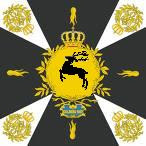
I haven't been doing any tabletop wargaming or even blog posting for a bit, down to both other wargames projects demanding attention and my desktop PC becoming deeply unstable and freezing every few minutes, forcing me into my 'lifeboat' PC of an old and battered laptop! Still, I have managed to stay active in other ways. I have recently been revamping the way I keep records of my campaigns, and thought I'd explain what I was up to.
From reading various blogs and solo-wargaming podcasts, it dawned on me that I was rather under-exploiting one of the big opportunities of a solo campaign, which is to record everything in a very detailed and colourful narrative, to re-read at leisure like a historical novel. I had a think, re-read a bit of 'Wargame Campaigns' by CS Grant and got underway!
Above is a snap of my journal, which I bought out of Asda (about £4 and pretty hefty pages, hardback cover, unlined, plus 3 pockets at the back to store loose sheets of paper.) As per Grant's sensible suggestion, I wrote out a list of all generals and units in the campaign on a strip of paper, which I then glued to the left-hand side (as you can see in the photo above) to form a fold-out 'flap' with all the units and characters listed. Now when I use each left-hand page as a ledger I don't have to write out headings for unit names and characters over and over again.
The left-hand page records each unit in three broad columns, which read left-to-right as 'at the start of the turn' then 'during the turn' and 'at the end of the turn.' Mostly this is about their physical location in the game world, so I can track armies and do the functional basics of campaign record-keeping.
The right-hand page can be used for the heart of the campaign record, in the form of a prose-style account of the turn, spiced up with the odd hand-drawn map, sketched drawing (no doubt sketched by some artistically-minded gentleman on campaign) and fictionalised quoted excerpts from the private correspondence of eye-witnesses, in the style of whatever actual historical book you prefer! A good opportunity to take advantage of is not just to discuss what happens, but what might have happened at various stages as the campaign strategies unfold. This all adds to the narrative (as well as builds up a stock of future scenario ideas, which no wargamer should be without!)
So, that's what I've been up to with my Muckenmire campaign, setting it into the new format before it truly gets going. Through it, I have recorded the setup and first two moves, which have now brought two armies within battle-fighting distance. The whole process of working backwards in my disorganised notes proved longer than I thought, but I think I'm finally sorted now! I shall post on the blog an update on the situation to fill all you on-line readers in, so you can see how it has come once again to the battlefield. Then, I hope this coming weekend to get the (small-sized) battle fought and recorded, allowing me to give the long-promised Black Powder rules set detailed example of play.
So, there you go - still enjoyable wargaming work, although of an unavoidably behind-the-scenes nature! Sadly, the system is appealing and I now find myself buying yet more of these Asda notebooks to transfer all my other campaigns into the format too! (Is there any action in this hobby which doesn't lead to yet more action required?) :-)


5 comments:
You are an "evil" fellow, sir . . . well not really evil . . . heck you wouldn't even qualify as a vile Stagonian . . . but now you have me wanting to do this notebook thing.
-- Jeff
Sometimes I keep extremely elaborate records ...
sometimes, I just make notes of high points...
But the more I think of the people in the campaign and their stories, the more interesting it is and the longer the setup rides in my enfeebled brain ...
It's a fine system, and with the added advantage of not being computer-based. Computers crash and wipe out years of work at a stroke. The worst a pen can do is run out of ink.
Very nice journal.
The concept is straight-foward.
The work minimal.
The data helpful.
The history priceless.
The pleasure yours for years to come.
Enjoy it.
Jim
I usually keep a running record of battles while I'm fighting them, but in a very "not ready for publication of any sort" kind of way. Lots of pencil sketches of battle maps, jotted notes. I should get more organized and/or transfer some of the old stuff to a pen and ink journal.
Post a Comment